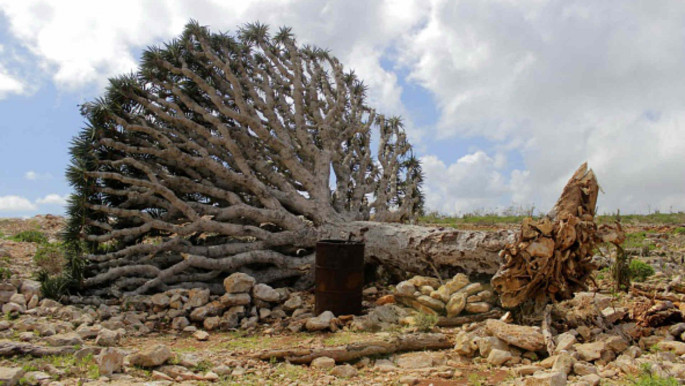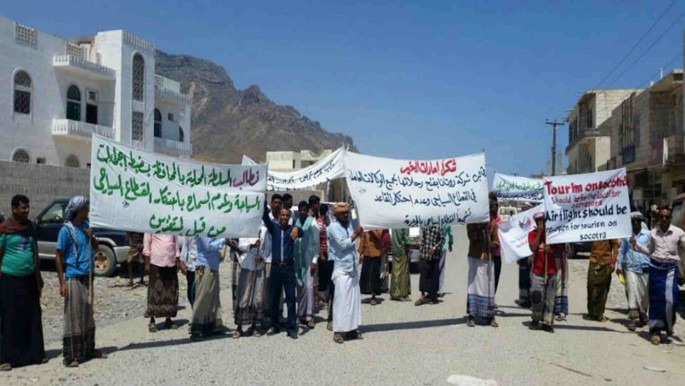Has the UAE colonised Yemen's Socotra island paradise?
Today, it is at the centre of a power struggle between Yemen's internationally recognised government and its ally, the UAE.
In the latest episode of the standoff, the UAE confirmed on Monday 15 May it uses Socotra as a base for military training.
The UAE forms part of the coalition of nine Arab states involved in a bombing campaign in Yemen since March 2015, backing Yemen's President Abdrabbuh Mansur Hadi.
The coalition supports Hadi's Aden-based government in its fight against the Houthi-Saleh alliance controlling the capital Sanaa and large swathes of territory in the north.
But the UAE has been on a shopping spree in the region, securing a military base in the port of Berbera in neighbouring Somaliland - an autonomous region of Somalia - in a controversial vote during which opponents were escorted from the legislature's chamber.
It also occupied the Yemeni islet of Perim, previously under control of Houthi rebels, in the Bab al-Mandab strait.
The UAE has also been extending its influence in south Yemen, reportedly backing the leaders of a recent secession attempt.
| Read more: Yemen's 'third government' emerges in southern Yemen | |
The UAE is now understood to be looking at the strategically placed Socotra archipelago with interest, causing friction with Hadi and within the coalition.
Unconfirmed reports claim that Hadi leased Socotra and nearby Abd al-Kuri island to the UAE for 99 years before fleeing the country for Riyadh in 2014. The power vacuum created by the conflict offered the UAE an occasion to extend its influence over the archipelago.
When Cyclone Megh hit Socotra in November 2015, the Emirates Red Crescent - the UAE branch of the international Red Cross - reportedly injected more than $1.6bn in aid for Yemen, reconstructing Socotra's airport and renovating 18 schools according to UAE media.
 |
|
| Dragon's blood trees suffered in Cyclone Megh [Anadolu] |
But critics say the UAE used humanitarian aid to appropriate the island.
Reports say UAE officials have been paying local authorities in exchange for a lenient approach to their development plans.
Since the year 2000, nearly 70 percent of the Socotra archipelago has been protected by a UN plan as a natural reserve, prohibiting construction on much of the island.
But reports of UAE-sponsored developments, including in the residential city of Zaed - a port, hotels, roads and petrol stations - have been circulating on social media, angering Yemeni authorities.
On Sunday 7 May, the Yemeni authority for the conservation of historic places called on UNESCO to protect the archipelago of Socotra from "dredging" by "occupying" UAE forces.
Twitter Post
|
"Very large [swathes of] land have been occupied by the Emiratis. This is a violation of the laws of the state, the protectorates and the protection of the coast," said an official from Socotra's Environment Agency.
He wished to remain anonymous, as many Socotrans are still receiving desperately needed aid from the UAE - and he is afraid that negative publicity could hurt its beneficiaries.
He feels frustrated at the lack of power to counter and contain the damage: "The local authority cannot do anything against the power of the rich Emiratis, and as a result they are doing as they please. The United Nations has no possibility of suspending the Emiratis because they have no representatives in Socotra."
Locals accuse the UAE of using fishing fleets which deplete the fish stocks and push native fishermen out of work. The fish is then allegedly exported on military ships and aircraft to UAE restaurants and supermarkets.
 |
|
| Banners read: 'Against tourism monopoly' and call for open access to the island [Twitter] |
Conservationists also decried the UAE's intense development activity, often breaching the natural reserve boundaries, and erecting walls and fences around wild beaches.
According to biologists, Socotra's unique environment is already suffering the effects of climate change and overgrazing. Human development on a large scale could tip one of the world's last pristine ecosystems beyond the point of no return.
The island's natural heritage is waning rapidly, and the local population, caught in the middle of a political power game, is feeling its consequences.
For decades, anthropologists have been studying how the island's unique culture - including an unwritten Semitic language spoken by a native ethnic group, the Mehri (numbering just 70,000 people in 1990) - has inevitably been affected by the arrival of tourism in the 1990s.
But so far Socotra was too far and poorly connected to attract mass tourism.
Since April 2017, the Abu Dhabi-based Rotana Jet airline has operated weekly commercial flights directly linking the UAE to Socotra, bypassing Aden's authority, hoping to turn Socotra into a tourism hotspot.
Twitter Post
|
Local tourism operators have protested against "the monopolisation of tourism by the UAE", which is reportedly controlling the influx of tourists by tying plane tickets to the purchase of a package holiday including hotel, car hire and guided tour - all provided by UAE business operators.
Since the UAE controls the air and naval traffic on the island, local operators are pushed out of the market.
Local youths have reportedly been granted ID cards to emigrate and work in the UAE as hotel maids, shop assistants and companies security guards, draining the local economy of labour.
Aden's diminishing hold on southern Yemen has encouraged the UAE's expansionism, and a lack of oversight on this remote island risks depleting Socotra of its natural and cultural heritage.
The UAE ministry of foreign affairs was contacted to comment on this story, but did not to respond to our requests.
Follow Paola Tamma on Twitter: @Paola_Tamma





 Follow the Middle East's top stories in English at The New Arab on Google News
Follow the Middle East's top stories in English at The New Arab on Google News


